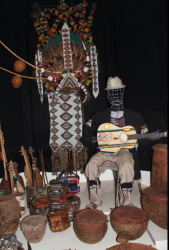A compelling attraction2015-03-03 It is easy to drive past the unassuming Phansi Museum on Esther Roberts Road in Glenwood, Durban without giving the building or its contents much thought. However, you are missing out on an enriching display of African art and culture. The Phansi Museum houses one of the biggest collections of African artefacts and traditional craftwork in the world.
The exhibition includes an impressive collection of traditional items, including Zulu beadwork, fertility dolls, African head rests, marriage hats, beer-pots and milk-pails. A compelling attraction is the marionette room, where 35 life-size puppets are dressed and adorned with beadwork, garments, and ceremonial objects, from the various ‘tribal’ regions of southern Africa. The innovative exhibition vividly displays the complex visual language that communicates regional identity and social standing through the use of colour, material and design. Phumzile Nkosi presents tours of the museum in an informative, yet personal manner. Her fervent insights into African culture, including music and dance are clearly conveyed through her stories, which adds much zest to the tour, ensuring that the museum exhibits come alive. Following a family celebration, Phumzile’s aunt lost her footing whilst crossing a flooded river. She would have been swept down the river and possibly drowned had her husband not grabbed on to her marriage hat and rescued her. Isicholos, Zulu marriage hats, are traditionally worn by married Zulu women. In many cases these were sewn onto the wearer’s own hair, in this case it was very fortunate. In addition, Zulu head rests were an important household item to accommodate these hats during sleep! Architect and collector Paul Mikula, started the museum in the basement of Robert’s House, which, now a Victorian National Monument, was built in 1898. The gracious building with its beautiful stained glass windows and wooden floors is well worth a visit in its own right. Esther Roberts was one of the first female anthropologists in South Africa, and was born and then lived her whole life in the Robert’s House where the museum is sited. The name ‘Phansi’, which means ‘down’ or ‘below’ in Zulu and is also the place beneath, where the ancestral spirits dwell. Gradually the collection grew and the whole house is now being utilised for the exhibition. Other collectors have also donated various items. The museum has a partnership with the Amazwi Abesifazane (Voices of Women) memory cloth project, established by Andries Botha and houses an archive of more than 2 000 memory cloths. Examples of renowned Maggie Mikula’s ceramic art are also displayed here. Paul Mikula has handed the running of the museum to his son Max Mikula. However Paul Mikula says that while small tourist groups and school visits from around KZN are common, he would love to see more local residents visiting the museum and enjoying is offerings. Clearly, the museum is a must see attraction in Durban, especially for those in search of cultural, traditional and historical attractions. Open 8am-4pm Mon-Fri, weekends by appointment. The museum is governed by the Phansi Museum Trust, a registered Non-Profit Organisation. Phansi musuem Tel: +27(31)206 2889 Mobile: +27(83)450 3270 Email: info@phansi.com |
A compelling attraction
Copyright © 2025 KwaZulu-Natal Top Business
